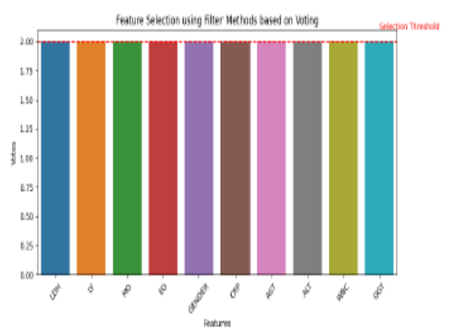


Indian Journal of Science and Technology
Year: 2024, Volume: 17, Issue: 4, Pages: 317-324
Original Article
N Hari Priya1*, S Rajeswari2
1Research Scholar, Department of Computer Science, Sree Saraswathi Thyagaraja College, Pollachi, Tamil Nadu, India
2Associate Professor, Department of Computer Science, Sree Saraswathi Thyagaraja College, Pollachi, Tamil Nadu, India
*Corresponding Author
Email: [email protected]
Received Date:13 October 2023, Accepted Date:28 December 2023, Published Date:20 January 2024
Objective: The main objective of this study is to determine the most important blood test markers that may indicate the presence of COVID-19 in a patient. To utilize the Cuckoo Search algorithm with SVM to explore the feature space efficiently and select features that contribute significantly to the model's performance. Methods: A novel hybrid method for feature selection has been proposed with the goal of improving the predictive capabilities of Support Vector Machines (SVM) for determining COVID-19 severity. Blood test datasets are used in the implementation of this study. The dataset has been split into two parts: 80% for training and 20% for testing. First, we use two statistical measures, chi-squared and mutual information, from the filter approach to minimize the feature dimensions. As a wrapper for SVM, we then use a modified Cuckoo Search algorithm. To measure how well the proposed approach works, we used evaluation metrics such as accuracy, precision, recall, and F1 score. Findings: The SVM classifier achieved the best performance with the features obtained from the proposed hybrid method, and the SVM classifier obtained an accuracy of 92% using the blood test dataset. The outcomes demonstrate that our hybrid approach effectively picks a subset of features that makes the model simpler while also making it more accurate and faster to compute. Novelty: This research work proposes a new hybrid feature selection technique by combining filter and wrapper methods to find the best feature set. This combination is introduced for the first time in this type of work related to COVID-19 prediction in which the results of Chi-Square and Mutual Information are used by the modified Cuckoo-Search algorithm to find the top features pertaining to COVID-19 severity and also to improve the performance of SVM model.
Keywords: Feature selection, Cuckoo search, Machine learning, Support Vector Machine (SVM), Severity prediction, Healthcare
© 2024 Priya & Rajeswari. This is an open-access article distributed under the terms of the Creative Commons Attribution License, which permits unrestricted use, distribution, and reproduction in any medium, provided the original author and source are credited. Published By Indian Society for Education and Environment (iSee)
Subscribe now for latest articles and news.